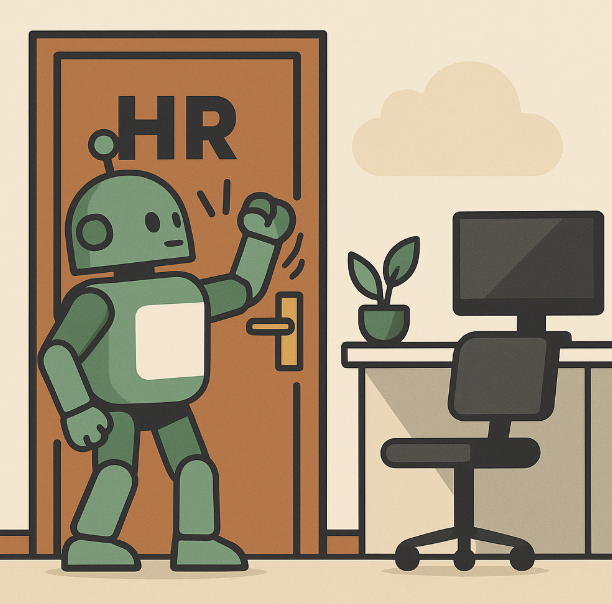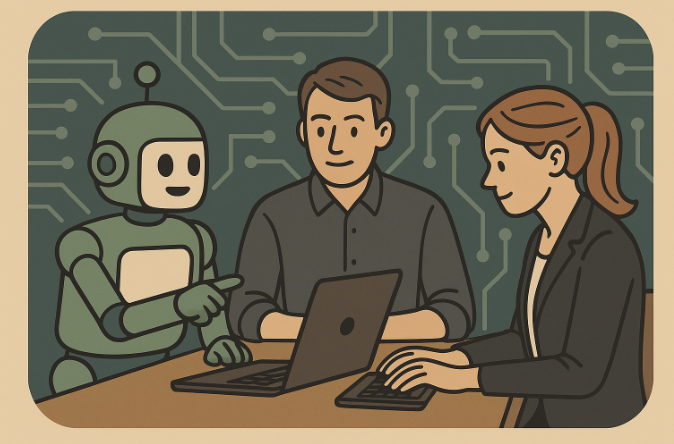I spent over 15 years in Human Resources, and if I'm being honest, somewhere along the way HR stopped being about people and started being about portals, paperwork, and processes nobody actually wanted to deal with.
I handled employee relations, rolled out policies nobody was excited about, survived tech migrations that broke more than they fixed, and spent way too much time patching up HR systems that were barely holding together. HR was supposed to be about helping people build careers and growing companies that mattered. Instead, it became a never-ending mess of approvals, spreadsheets, and policies nobody actually read. (Honestly, what average employee has time for that? They have better things to do. Plus, HR policies are not exactly thrilling material. Like Yoda said in the best movie in the Star Wars franchise, The Last Jedi - I said what I said - "Page-turners, they are not.")

Most days it felt like I had a PhD in "Updating Emergency Contacts 101" and "Advanced Password Resetting." Instead of helping people, I was helping systems stay barely functional. It was repetitive, mind-numbing, and endlessly time-consuming. It was work that made it look like you were doing something important but never actually moved the business forward.
Now AI is knocking on HR's door. The real question is: do we open it, or bolt it shut?
It Is Called Human Resources, Not Robot Resources
Managing people has always been complicated, but somewhere along the line it got ridiculous. Instead of solving real problems, HR got buried in admin work. Updating records. Pushing paperwork. Managing systems nobody wanted to log into unless absolutely necessary.
I remember having to enter an already approved requisition, signed off by the higher-ups, just so we could post it for candidates to apply. But somehow, the system still forced us to get approval again from the department director, the hiring manager, and some random faceless guy in Finance whose only job was to hit the "Approve" button (I wish I was joking). This person often held up the process for literal days, while we chased them down with multiple higher-ups emailing just to get them to click a button. Utterly redundant. Utter nonsense. That disconnect between helping humans and servicing broken systems is what's been killing the spirit of HR for years. And this was at a major Fortune 500 company. Just mind-numbing bureaucratic nonsense.
Employees don't want to feel like a number. They want fast answers, clear policies, and someone who's actually available when they need help. HR tech promised that - but often delivered the opposite.

HR's Rocky Relationship With Technology
HR and tech have always had a love-hate thing going on. Moving data to the cloud was a massive step forward, but it also meant moving the chaos with it. Payroll lived here. Benefits lived there. Time-off systems were their own special brand of nightmare.
Every new platform that promised "one login for everything" somehow still ended up needing three different passwords and a "forgot your username" link. Employees stopped even trying to use HR tools unless they had no choice. HR teams spent more time fixing broken processes than actually helping people.
Tech was supposed to make HR better. It made it more complicated.
Now AI is showing up. And it isn't knocking gently.
Meet the HR Assistant You Didn't Know You Needed
Imagine this: no more logging into three systems just to check your PTO balance. No more digging through portals to find a policy. No more emailing HR and waiting three days for a reply.
You just open a chat and ask:
Employee: "How many vacation days do I have left?"
Assistant: "You have 41.5 hours. Want me to help you book some time off?"
Employee: "Schedule me off August 12 to August 16."
Assistant: "Done. Enjoy your time away."
Or maybe:
Employee: "Can you send me my last W-2?"
Assistant: "Just emailed it to you. Anything else you need?"

Instead of guessing which portal has the answer, you just ask one question and get one answer. If it's public company info, the system pulls it immediately. If it's personal, it securely accesses your employee record without oversharing or violating permissions.
Think of it like an HR search engine that can also take action. It finds what you need, handles the request, and keeps everything secure in the background.
Sounds Great, But...
Building this kind of system is hard. It has to connect to your payroll, benefits, HRIS, and internal knowledge bases. It has to know what you're allowed to see and what you're not. It has to be accurate and secure every time.
General company info is easy. Personal employee data is where it gets tricky. A real GenAI HR system has to enforce privacy, check permissions, and confirm everything before it acts.
If it gets that wrong, trust is gone. And HR can't afford that.
HR's Next Evolution
HR leaders have two choices. Embrace AI and bring the human side of HR back to life, or keep clinging to manual processes and get left behind. Quickly.
Let's be real. The boring stuff is already disappearing. AI is screening resumes, running first-round interviews, answering the same payroll questions everyone asks, and flagging burnout risks before they become bigger issues. Nearly a quarter of HR tasks could be fully automated in the next few years (Gartner). More than half of HR leaders are already using AI to streamline repetitive work (SHRM). This isn't hypothetical. It's happening right now.
I've watched HR move from file cabinets to cloud portals - and now to something bigger. This shift isn't about doing the same tasks faster. It's about giving HR the space to lead. To coach managers. To grow culture. To stop babysitting workflows and start making a real impact.
But here's the uncomfortable truth: this shift isn't optional. Not anymore. More than half of typical HR tasks are on the chopping block (McKinsey). If your role doesn't evolve, it disappears. Period.
The future belongs to HR pros who lean in, learn the tools, and use AI to make themselves indispensable, not invisible.
Final Thoughts
Human Resources doesn't have to choose between tech and people. We can have both - if we're smart about it. The best HR teams will use AI to make HR more human, not less.
Should HR open the door to AI? Absolutely. Open it. Kick it wide open.
Just make sure you're building systems that protect what matters most: the people behind the data.
One of my favorite colleagues I ever worked with in HR, Danny Hudson, once told me, "Never forget to put the human in Human Resources." It's something I've carried with me ever since - and something too many companies, and honestly, even some HR teams, seem to forget.
Shameless Plug
At Apolo, we build AI tools that help HR teams work smarter, faster, and with less chaos. Whether you want to automate the boring stuff or build an intelligent HR assistant that employees actually enjoy using, we can help you do it safely and securely.
Because making HR better isn't about replacing people. It's about letting people finally focus on the work that matters.
.svg)


